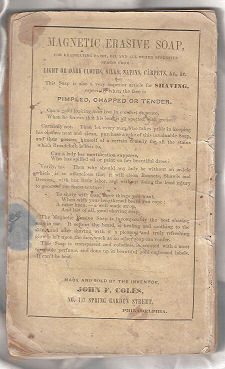Sunday, October 29, 2006
Tiny Ninja Hamlet
Now, here's something I'd pay good money to go see....

...The Telegraph reports the Royal Shakespeare Company is staging Tiny Ninja Hamlet.

...The Telegraph reports the Royal Shakespeare Company is staging Tiny Ninja Hamlet.
Saturday, October 28, 2006
The Molecatcher's Daughter
I'm on NPR Weekend Edition for this segment with Scott Simon about the most infamous murder case in 19th century Britain: the "Red Barn Murder" of Maria Marten by William Corder in 1827, and the media circus that followed his arrest. It also marked the beginning of modern crime writing: James Curtis's account The Mysterious Murder of Maria Marten reads like an In Cold Blood of 1828.
I write on Curtis and the case in "The Molecatcher's Daughter" in the November issue of The Believer and -- make yourself a pot of tea, it's 12,000 words -- they've got the entire article online.
There's also an extraordinary twist not noted in the NPR piece. The case produced a cache of unclaimed PO Box replies to a personals ad that Corder placed in the Times of London on November 25, 1827:
As far as I know, no study has ever been made of these letters, and they haven't been reprinted anywhere in many decades. But Corder's personals ad and a selection from the nearly 100 letters he received in response can now be found here on The Believer's site.
The letters range from witty and arch to frankly desperate; what's particularly noticeable is the utter pragmatism and forthrightness of many of the responses. Hence:
Another response states flatly that "I have no fortune till the death of my mother." Which, well, might not have been the best thing to mention to someone like William Corder...
I write on Curtis and the case in "The Molecatcher's Daughter" in the November issue of The Believer and -- make yourself a pot of tea, it's 12,000 words -- they've got the entire article online.
There's also an extraordinary twist not noted in the NPR piece. The case produced a cache of unclaimed PO Box replies to a personals ad that Corder placed in the Times of London on November 25, 1827:
That the ad replies survived at all was due entirely to the notoriety of Corder's trial; otherwise they surely would have eventually been burned as unclaimed trash. But they are a unique recorda startlingly intimate peek into Regency-era life, with rootless young people leaving villages for industrialized cities and left to their own devices to form relationships. In this new urban world, where all one knew of anyone's past was what they told you, a predator could appear as a loving and gentle suitoryou could even marry a murderer and bear his child without realizing it.
As far as I know, no study has ever been made of these letters, and they haven't been reprinted anywhere in many decades. But Corder's personals ad and a selection from the nearly 100 letters he received in response can now be found here on The Believer's site.
The letters range from witty and arch to frankly desperate; what's particularly noticeable is the utter pragmatism and forthrightness of many of the responses. Hence:
[Sir,]
The advertisement of a private gentleman, aged twenty-four, in the Sunday Times newspaper, happened to meet the eye of a young lady, aged twenty-one, of the utmost respectability. The advertisement rather struck her; and, should the gentleman be really in earnest, he must advertise once again in the same paper, when he will hear further particulars. But the extreme modesty of the lady will not allow her to put her real name or address. The lady is at present in the country, but will shortly return to town.
N.B.The lady is not very handsome.
Another response states flatly that "I have no fortune till the death of my mother." Which, well, might not have been the best thing to mention to someone like William Corder...
Sunday, October 22, 2006
Stephen Colbert Has A Time Machine
I just love the idea that this book could even exist:

Better still, there's an ad on the back for "Magnetic Erasive Soap":

But... wait a second, turn back to that front page again and have a closer look....

My expert historical opinion: Stephen Colbert has escaped the bounds of time.

Better still, there's an ad on the back for "Magnetic Erasive Soap":

But... wait a second, turn back to that front page again and have a closer look....

My expert historical opinion: Stephen Colbert has escaped the bounds of time.
Step Into My Broadcast Booth, Baby
Either That, Or Mark Leyner's Behind It
Is it just me, or is Aleksey Vayner the second coming of Hugh Gallagher?
Aleksey:
Hugh:
Same person? You decide.
Aleksey:
Hugh:
I am a dynamic figure, often seen scaling walls and crushing ice. I have been known to remodel train stations on my lunch breaks, making them more efficient in the area of heat retention. I translate ethnic slurs for Cuban refugees, I write award-winning operas, I manage time efficiently. Occasionally, I tread water for three days in a row.
I woo women with my sensuous and godlike trombone playing, I can pilot bicycles up severe inclines with unflagging speed, and I cook Thirty-Minute Brownies in twenty minutes. I am an expert in stucco, a veteran in love, and an outlaw in Peru...
Same person? You decide.
Saturday, October 14, 2006
The Smoke Ring
Caleb Crain takes up last week's post on Philip Morris and runs with the ball:
There are many more goodies on this over at his site. Monbiot's book is apparently the first to show Philip Morris's efforts preceding Exxon's, and it's a revelation that's had curiously little play in the US yet. But there are a couple curious previous stories that crop up. From a December 2005 NY Times book review of The Republican War on Science:
But indeed they still do.
I thought I would see if I could find this particular document in the Legacy Tobacco Documents Library.... I'm guessing that Monbiot was referring to the "Proposed Plan for the Public Launching of the TASSC [The Advancement of Sound Science Coalition]," dated 30 September 1993, which on page 2 deprecates a launching through "top media markets" and prefers an approach that "Avoids cynical reporters from major media" in order to arrange for "less reviewing/challenging of TASSC messages." The fee for a 20-city launch was $60,000, as you may read on page 8 of the memo, though Philip Morris was given the option of economizing: a 10-city launch would only cost $35,000. As the letterhead reveals, the PR firm that created TASSC for Philip Morris was APCO Associates. They seem to be in business still; according to their website, it is part of their "Culture and Values" to "Tell the truth." No doubt.
There are many more goodies on this over at his site. Monbiot's book is apparently the first to show Philip Morris's efforts preceding Exxon's, and it's a revelation that's had curiously little play in the US yet. But there are a couple curious previous stories that crop up. From a December 2005 NY Times book review of The Republican War on Science:
"Doubt is our product," declared a 1969 Brown & Williamson memo spelling out the strategy, "since it is the best means of competing with the 'body of fact' that exists in the mind of the general public." After the E.P.A. released a report on the dangers of secondhand smoke in 1992, the Tobacco Institute berated the agency for preferring "political correctness over sound science." Within a year Philip Morris helped to create a group called The Advancement of Sound Science Coalition (Tassc), which challenged the risks not only of secondhand smoke but also of pesticides, dioxin and other industrial chemicals. (The executive director of Tassc in the late 1990's was Steven Milloy, who now "debunks" global warming and other environmental threats in the Foxnews.com column "Junk Science.") Newt Gingrich and other Republicans soon started invoking "sound science" and "junk science" while criticizing government regulations.The New Republic subsequently found a bounteously overflowing cornucopia of financial conflicts of interest for Milloy and his work as a "journalist." So you'd think Fox might stop using him.
But indeed they still do.
CBGB's Closing...
Saturday, October 07, 2006
Dept. of Helpful Advice
I've an article in this week's New Scientist about the archetypal book release nightmare:
Cheyne nonetheless remained the favored physician of literati like Alexander Pope and Samuel Richardson, to whom he offered the helpful advice that the plot of Pamela needed more house fires and broken bones. (This, I think, would be 18th century literature's equivalent to demanding "More cowbell.")
Another would-be Pamela co-writer, by the way, was my old favorite George Psalmanazar. But I'm afraid Richardson wasn't too impressed with his contribution.
By the time he arrived in London for medical treatment in 1725, George Cheyne was in a terrible state. Headaches racked his brain, and gout blistered his legs in sores until they appeared "burnt almost like the Skin of a roasted Pig", as he put it. Above all, there was his weight, which at times rocketed to 32 stone (203 kilograms). He was left tormented with depression - and no wonder. That he was a physician himself was bad enough, but added to that was the crowning indignity: at this very moment, Dr Cheyne was being touted from the bookstalls as the diet guru of the day.
Cheyne nonetheless remained the favored physician of literati like Alexander Pope and Samuel Richardson, to whom he offered the helpful advice that the plot of Pamela needed more house fires and broken bones. (This, I think, would be 18th century literature's equivalent to demanding "More cowbell.")
Another would-be Pamela co-writer, by the way, was my old favorite George Psalmanazar. But I'm afraid Richardson wasn't too impressed with his contribution.
Smokescreen
Just when you thought Philip Morris couldn't get any more comically Bond-villain evil, it turns out that they have been covertly funding a global-warming denial campaign.
In his new book Heat: How to Stop the Planet Burning (a Penguin UK book with no US release -- what gives, Penguin?), Oxford prof George Monbiot dug up the documentation. From his interview on NPR's On The Media:
Monbiot also ripped micro-power advocates a new one in a recent New Scientist piece by revealing how their shaky home generation statistics often hide a lousy return on investment, and more generally noting that you get vastly greater efficiencies of scale by pushing for large alt-power generators (offshore, say) and then bringing it in over transmission lines.
It's a point reminiscent of one raised by Elizabeth Royte's wonderful Garbage Land -- a point late in the book which few reviewers noted, by the way. After tracking the trail of her trash throughout the Northeast, she's appalled to discover that industrial and ag sources produces exponentially more waste than households do. In other words, by the time consumer goods reach you, your little efforts at virtue are pretty pathetic. It makes far more sense to (a) reduce demand, and (b) regulate the manufacturing process. But we're so busy feeling good about sorting plastic from aluminum that industry can do pretty much what it damn well pleases.
In his new book Heat: How to Stop the Planet Burning (a Penguin UK book with no US release -- what gives, Penguin?), Oxford prof George Monbiot dug up the documentation. From his interview on NPR's On The Media:
GEORGE MONBIOT: They realized that if passive smoking was the only thing they campaigned on, their fingerprints would be all over it. So they were advised not to campaign only on passive smoking but to link it with other issues which bore on regulatory matters, and the first of those issues was global warming.
BROOKE GLADSTONE: What's the evidence that you have to document this campaign?
GEORGE MONBIOT: The great thing about one of the big lawsuits against the tobacco companies is that one of the outcomes was to force the companies to put their archives on public record. And so you can go through the source material documenting exactly what their strategy is. And in this case, they say, we're going to set up this so-called grass roots coalition.... One of the campaigns, which was by far and away the most central to corporate-funded climate change denial, the Advancement for Sound Science Coalition and junkscience.com and the other things that it spawned, was actually started by Philip Morris rather than by Exxon. And Exxon only came in later.
Monbiot also ripped micro-power advocates a new one in a recent New Scientist piece by revealing how their shaky home generation statistics often hide a lousy return on investment, and more generally noting that you get vastly greater efficiencies of scale by pushing for large alt-power generators (offshore, say) and then bringing it in over transmission lines.
It's a point reminiscent of one raised by Elizabeth Royte's wonderful Garbage Land -- a point late in the book which few reviewers noted, by the way. After tracking the trail of her trash throughout the Northeast, she's appalled to discover that industrial and ag sources produces exponentially more waste than households do. In other words, by the time consumer goods reach you, your little efforts at virtue are pretty pathetic. It makes far more sense to (a) reduce demand, and (b) regulate the manufacturing process. But we're so busy feeling good about sorting plastic from aluminum that industry can do pretty much what it damn well pleases.
Sunday, October 01, 2006
Ever Feel Outnumbered?
Beware The Fake Dentist
Over in The Scotsman, Stuart Kelly reviews Magnus Magnusson's Fakes, Forgers, and Phoneys, which notes such delights as "The Odontist (a poor 19th-century dentist who became a literary sensation despite the fact all his poems were jokes made up by Sir Walter Scott's son-in-law)." But it also brings up an interesting subset of forgery: the real that appears to be fake.
Judge for yourself -- U Virginia has the entire text online.
One of the loveliest parts of Magnusson's book is the account of Ellen and William Craft. Their autobiography - Running A Thousand Miles For Freedom - related how they escaped from the Southern States disguised as a white master and his servant. Part of the problem with reading about fakers is the suspicious cast of mind it gives the reader. Was this a faked piece of abolitionist propaganda? A cynical tug on the heart strings, albeit for a worthy cause? No. Ellen did pass herself off as a white man, and escape from slavery with her husband.
Judge for yourself -- U Virginia has the entire text online.

